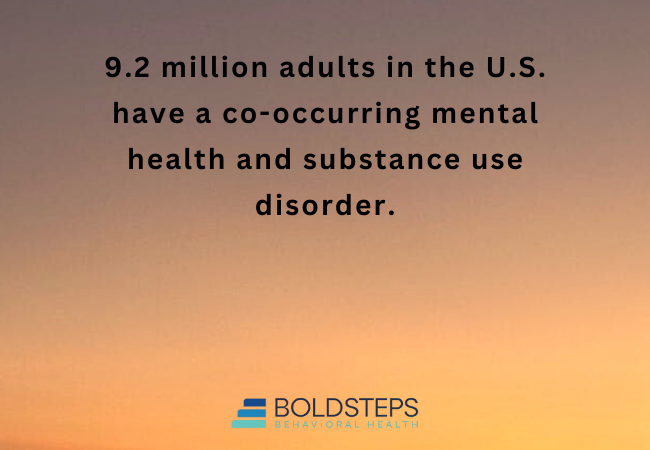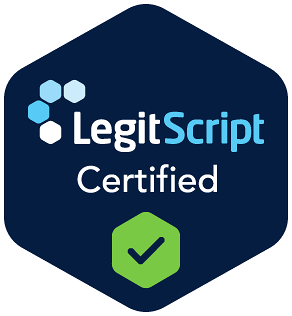For individuals struggling with substance use disorder (SUD) and mental health conditions, recovery can feel overwhelming. When addiction and mental health challenges occur together—also known as a dual diagnosis or co-occurring disorder—it requires a comprehensive and integrated approach to achieve lasting healing.
A Partial Hospitalization Program (PHP) provides a structured yet flexible treatment option that balances intensive care with real-world application, helping individuals stabilize, develop coping skills, and prepare for independent recovery. At Bold Steps Behavioral Health in New Hampshire, our PHP is designed to treat both addiction and mental health disorders simultaneously, offering the medical support, therapy, and recovery strategies needed for long-term wellness.
This guide explores the importance of PHP in Dual Diagnosis Treatment, its role in bridging inpatient rehab and independent recovery, and how it equips individuals with the tools to rebuild their lives.
Understanding Dual Diagnosis: What Are Co-Occurring Disorders?
A dual diagnosis occurs when an individual has both a substance use disorder (SUD) and a mental health disorder, such as:
- Anxiety disorders (Generalized Anxiety Disorder, Panic Disorder)
- Depression and mood disorders
- Post-Traumatic Stress Disorder (PTSD)
- Bipolar disorder
- Obsessive-Compulsive Disorder (OCD)
- Schizophrenia or psychotic disorders
- Borderline Personality Disorder (BPD)
How Common Are Co-Occurring Disorders?
- 9.2 million adults in the U.S. have a dual diagnosis (SAMHSA, 2022).
- 50% of individuals with a mental health disorder will experience a substance use disorder at some point (Journal of the American Medical Association).
- 60% of people with a dual diagnosis do not receive treatment for both conditions (National Institute on Drug Abuse, NIDA).
Why Treating Both Conditions Together Matters
- Mental health symptoms often drive substance use—individuals may turn to drugs or alcohol to self-medicate.
- Substance use worsens mental health conditions, making symptoms more severe.
- Addressing only one condition leads to higher relapse rates—treating both simultaneously improves long-term recovery outcomes.
A Dual Diagnosis Treatment Program in New Hampshire ensures both conditions are treated together, allowing individuals to develop lasting coping strategies and a stable foundation for recovery.
What is a Partial Hospitalization Program (PHP)?
A Partial Hospitalization Program (PHP) is an intensive outpatient treatment model that offers structured therapy and medical support during the day while allowing individuals to return home in the evenings.
Key Features of PHP for Dual Diagnosis Treatment:
- Full-day treatment (5-6 hours per day, 5 days per week).
- Integrated mental health and addiction care with therapy, medication management, and relapse prevention.
- Psychiatric evaluations to assess and treat co-occurring mental health disorders.
- Evidence-based therapies to develop healthy coping skills and emotional regulation.
- Medical supervision and medication-assisted treatment (MAT) when needed.
- Life skills training and transitional support for long-term recovery.
PHP serves as a bridge between inpatient rehab and outpatient care, offering intensive support in a flexible, non-residential setting.
The Role of PHP in Treating Co-Occurring Disorders
1. Integrated Mental Health and Addiction Treatment
A Partial Hospitalization Program is uniquely designed to treat both addiction and mental health disorders in a comprehensive and personalized way.
At Bold Steps Behavioral Health, our PHP includes:
- Psychiatric evaluations and ongoing mental health support.
- Cognitive Behavioral Therapy (CBT) to address negative thinking patterns.
- Dialectical Behavior Therapy (DBT) to improve emotional regulation and distress tolerance.
- Trauma-Informed Therapy to help individuals heal from past trauma.
- Medication management and monitoring for individuals with mental health conditions.
This dual approach ensures individuals receive the support they need to manage both their addiction and mental health symptoms effectively.
2. Structured Support Without Full-Time Residential Care
Many individuals with co-occurring disorders need structured treatment but do not require 24/7 inpatient care. PHP provides a high level of support while allowing individuals to apply recovery skills in real-life settings.
Benefits of PHP Structure:
- Maintains daily routines while receiving intensive therapy.
- Provides a safe and supportive environment to prevent relapse.
- Gradually transitions individuals to independent living with continued professional guidance.
This balance of structured therapy and independence allows individuals to practice real-world recovery skills while receiving professional support.
3. Medication Management and Psychiatric Care
Many individuals with dual diagnosis require medication to manage mental health conditions safely. However, medication use must be carefully supervised, especially in addiction recovery.
At Bold Steps Behavioral Health, our PHP includes:
- Medication-Assisted Treatment (MAT) for addiction recovery.
- Psychiatric evaluations and medication adjustments.
- Regular medical check-ins to monitor treatment effectiveness.
This medical oversight ensures that individuals receive safe, effective, and personalized care for both addiction and mental health disorders.
4. Life Skills Training for Long-Term Recovery
In addition to therapy and medical care, PHP also focuses on building life skills that promote long-term recovery and emotional stability.
PHP at Bold Steps Behavioral Health Includes:
- Healthy communication and boundary-setting skills.
- Job readiness and career coaching for reintegration into work.
- Time management and self-care planning.
- Stress reduction techniques, mindfulness, and meditation.
These practical skills help individuals develop confidence and resilience as they transition into independent recovery.
The Importance of Family Involvement in PHP
How Family Support Enhances Dual Diagnosis Treatment
Family and loved ones play a crucial role in supporting individuals in PHP. At Bold Steps Behavioral Health, we offer family therapy and education to help loved ones:
- Understand addiction and mental health conditions.
- Develop communication strategies that encourage recovery.
- Set healthy boundaries and avoid enabling behaviors.
- Create a strong support network to prevent relapse.
Family involvement strengthens recovery by providing stability, encouragement, and accountability.
Who Can Benefit from PHP for Dual Diagnosis Treatment?
A Partial Hospitalization Program is ideal for individuals who:
- Have both a mental health disorder and a substance use disorder.
- Need intensive therapy but do not require 24/7 inpatient care.
- Require medication management and psychiatric support.
- Have completed inpatient rehab and need structured step-down care.
- Struggle with relapse triggers in early recovery.
Why Choose Bold Steps Behavioral Health for PHP in New Hampshire?
At Bold Steps Behavioral Health, we believe that recovery is not just about treating addiction or mental health disorders individually—it’s about healing the whole person. Our Partial Hospitalization Program in New Hampshire is specifically designed to provide comprehensive, compassionate, and evidence-based care for individuals with co-occurring disorders. Here’s why we stand out as the best choice for Dual Diagnosis Treatment in New Hampshire:
1. Integrated Dual Diagnosis Treatment Approach
Unlike traditional programs that treat addiction and mental health separately, our PHP provides a fully integrated treatment approach that helps individuals heal from both conditions simultaneously. Our program includes:
- Psychiatric care and medication management to stabilize mental health symptoms.
- Addiction treatment programs tailored to each individual’s substance use history.
- Therapeutic interventions such as Cognitive Behavioral Therapy (CBT) and Dialectical Behavior Therapy (DBT).
- Relapse prevention strategies designed for long-term sobriety.
2. Expert Clinical Team
Our dedicated team of licensed therapists, addiction specialists, psychiatrists, and medical professionals work together to create customized treatment plans that address each individual’s specific needs.
3. Structured Yet Flexible Treatment
Our PHP program provides the structure needed to maintain stability while allowing individuals to practice real-world recovery skills outside of treatment hours. This balance helps individuals:
- Gradually transition from inpatient rehab to independent living.
- Apply coping strategies in everyday situations while receiving professional support.
- Reduce the risk of relapse by reinforcing healthy habits and skills.
4. Step-Down Continuum of Care
Recovery doesn’t stop when PHP ends. At Bold Steps Behavioral Health, we ensure continuity of care through:
- Intensive Outpatient Programs (IOP) for continued therapy and peer support.
- Outpatient Treatment Programs (OP) for long-term recovery maintenance.
- Virtual Treatment Programs for those who need flexibility in their treatment schedule.
5. A Supportive and Judgment-Free Environment
Recovery is a deeply personal journey, and we are committed to providing a safe, compassionate, and nonjudgmental space where individuals feel respected, supported, and empowered.
Whether you or a loved one is transitioning from inpatient rehab or seeking intensive outpatient care, our PHP in New Hampshire is designed to provide the structure, therapy, and medical support needed to build a strong foundation for long-term recovery.
Conclusion
Recovering from a co-occurring disorder can feel like an uphill battle, but you don’t have to face it alone. At Bold Steps Behavioral Health, our Partial Hospitalization Program in New Hampshire provides the tools, support, and guidance necessary to overcome addiction and mental health challenges simultaneously.
Why Now Is the Right Time to Seek Treatment
- Early intervention leads to better recovery outcomes.
- A structured PHP helps prevent relapse and reinforces healthy habits.
- Treating both addiction and mental health together ensures lasting stability.
If you or a loved one is struggling with addiction and mental health issues, it’s time to take a bold step toward a healthier, brighter future. Call us today at (603) 915-4223 to learn more about our PHP, IOP, and Outpatient Treatment Programs in New Hampshire.
FAQ on PHP Helps in Treating Co-Occurring Disorders
What is Dual Diagnosis Treatment?
Dual Diagnosis Treatment refers to integrated care for individuals with both a mental health disorder and a substance use disorder. Common co-occurring conditions include anxiety, depression, PTSD, bipolar disorder, and addiction.
What is a Partial Hospitalization Program (PHP)?
A Partial Hospitalization Program (PHP) is an intensive, structured day treatment program that provides:
- 5-6 hours of therapy per day, 5 days a week.
- Integrated addiction and mental health treatment.
- Medical supervision and psychiatric care.
- Therapies such as Cognitive Behavioral Therapy (CBT) and Dialectical Behavior Therapy (DBT).
How does PHP help with Dual Diagnosis Treatment?
PHP is effective for treating co-occurring disorders because it provides:
- Structured therapy and support for managing both addiction and mental health.
- Medication management and psychiatric care for symptom stabilization.
- Relapse prevention strategies tailored to individuals with dual diagnoses.
- Step-down support from inpatient rehab, allowing individuals to transition to independence safely.
Who is a good candidate for PHP in Dual Diagnosis Treatment?
PHP is ideal for individuals who:
- Struggle with both addiction and mental health issues that require intensive support.
- Have completed inpatient rehab and need a structured step-down program.
- Need psychiatric care and medication management in a structured setting.
- Are at risk of relapse and require a higher level of care than traditional outpatient therapy.
What therapies are used in PHP for Dual Diagnosis?
PHP includes a variety of evidence-based therapies, such as:
- Cognitive Behavioral Therapy (CBT): Helps change negative thought patterns.
- Dialectical Behavior Therapy (DBT): Focuses on emotional regulation and distress tolerance.
- Motivational Interviewing (MI): Strengthens motivation for recovery.
- Trauma-Informed Therapy: Addresses past trauma that contributes to addiction.
- Group and Family Therapy: Encourages peer support and family involvement.
Does PHP include medical supervision?
Yes, PHP at Bold Steps Behavioral Health provides:
- Medication-Assisted Treatment (MAT) when appropriate.
- Psychiatric evaluations and medication management.
- Medical monitoring for withdrawal symptoms and overall health.



